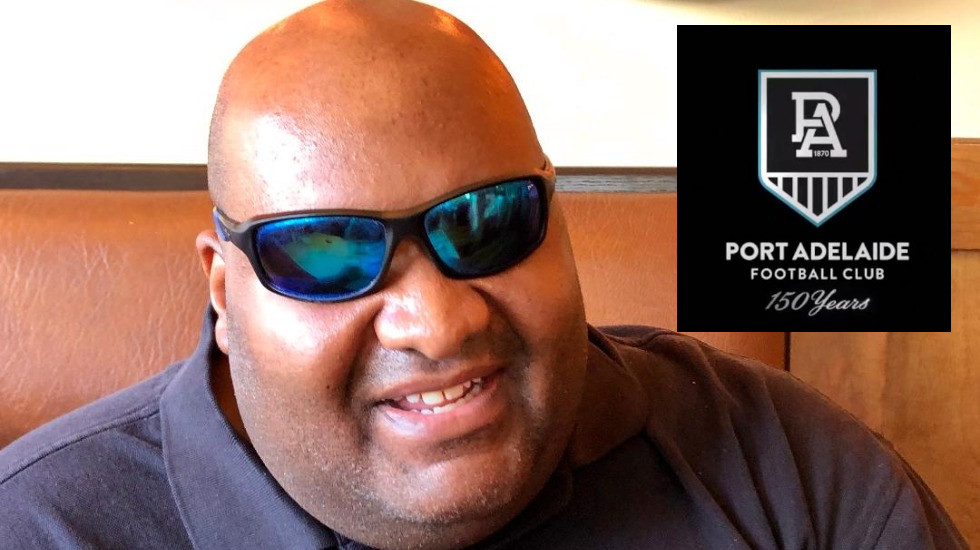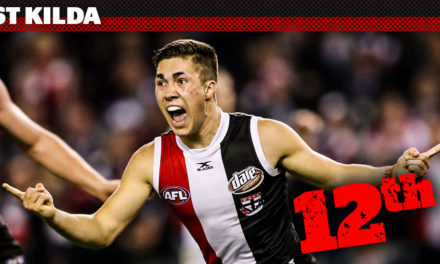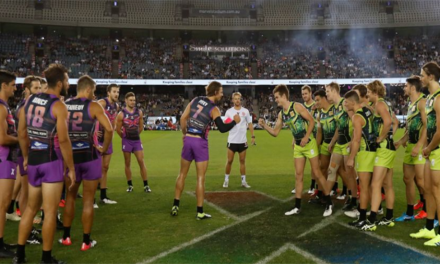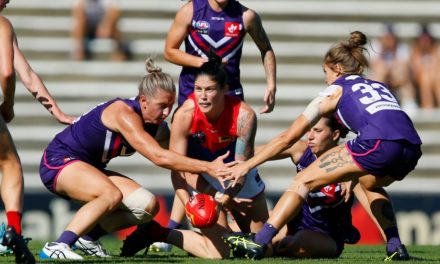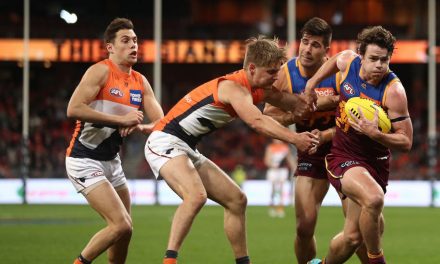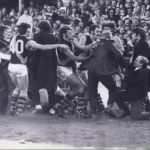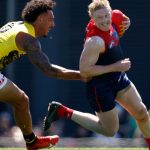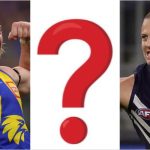Chuck Brady lives half-a-world away, and is blind, but there’s no Port Adelaide supporter more passionate.
Over the phone, you can practically still hear Chuck Brady’s heart dancing when he describes the magic moment from three years ago.
It’s a boundary throw-in from centre wing, outside Port Adelaide’s attacking 50. Paddy Ryder leaps, skilfully twists his big frame, then stealthily taps the footy over his left shoulder, to a waiting Robbie Gray, who has shed two St Kilda opponents.
Gray sprints to the 50-metre arc and with 14 seconds left on the clock, drops the footy on to his right boot, and unloads a titanic blast toward the big sticks. The home crowd’s roar builds to a crescendo as the Sherrin clears the goal square, the goal umpire signals a major score and the Power have pulled off a miraculous victory.
But Brady, who is 44 and lives half-a-world away, in Kansas City, Missouri, has never seen that rapturous moment. He has never been to Australia, never touched a Sherrin, never been on a footy ground and never seen Gray’s matchwinner, nor any other footy moment.
Brady, who at 3:50 am Friday (his time) will spare his sleeping wife by suppressing the urge to sing along with the Alberton crowd at Adelaide Oval to the INXS classic, “Never Tear Us Apart,” in its pre-bounce ritual before its preliminary final against Richmond, has been blind from birth.
For the last several years, you could never tear Brady away from whatever electronic device he has used to livestream Power matches and listen to the ABC’s broadcasts.
“I’m attached to this team and I can’t cheer for anybody else,” says Brady, who as a child, bonded with his father in the family’s Oklahoma City home, barracking for the University of Oklahoma Sooners NCAA College Football team, the NFL’s Dallas Cowboys, and Major League Baseball’s Texas Rangers and St Louis Cardinals, as they listened to radio broadcasts.
Brady’s passion for Port Adelaide started six years ago. A blind English mate introduced Brady to Aussie rules by emailing him a link to the AFL’s 2012 30-minute “AFL Explained” video.
“‘AFL Explained’ made the sport sound so awesome. I kept watching and kept watching and said: ‘This looks interesting,’” Brady says, with a hint of irony.
“It was in March and the season was about to start and I did some research. I kept livestreaming matches and listening and I kept picking new things up. I thought, ‘I LIKE this.’”
Then, for Brady, came the easy part. “I knew I had to pick a squad,” he recalls. “I liked Port’s fast-moving game style. At first, I didn’t know the players’ names, but then I got hooked.”
To uninitiated eyes, footy is hard to follow, especially for sports fans outside Australia who didn’t grow up with the game, suddenly having to keep track of the whereabouts of three dozen players on the ground at once. To blind eyes, like Brady’s, it represents a unique challenge.
“I’ve always processed things really well in other sports to understand where the spacing is, but it all comes down to really good commentators,” says Brady, a civil servant who works in telephone support.
“Footy is just one of those things where it takes a while for things to slow down and make sense. ABC Radio calls the game as it is. I listened to Gerard Whateley and now listen to Clint Wheeldon and Alister Nicholson.
“This is the first year that I’m able to track and understand someone leading out from the goal square, or someone kicking or handballing to a certain spot.
“Having former players and former coaches explain what they’re seeing today and why they’re seeing it is important; learning why someone like Marcus Bontempelli’s 25 touches are more influential than someone else’s 30 touches. You can’t watch the game and pick it all up.”
PLEASE HELP US CONTINUE TO THRIVE BY BECOMING AN OFFICIAL FOOTYOLOGY PATRON. JUST CLICK THIS LINK.
Brady was born with underdeveloped eyes. Until the age of five, a few bright colours and large shapes were all he could see. His parents then took him to the hospital for cornea transplant surgery, hoping that would restore and correct his vision.
Young Chuck’s parents told him at the time – as best they could explain to a child about to have major surgery – that the operation could work and all of his sight would return; his sight could return, but then over time, it could be lost; or he might not ever see again.
When the 5-year-old boy emerged from surgery, he had one immediate thought: “There’s nothing here anymore. Why can’t I see?”
Brady today is proud his parents, Chuck Sr. and Shirley, never treated him any differently from his siblings — two older brothers, a younger brother and a younger sister — all of whom are sighted. Shirley Brady, who had earned a degree in social work, made her living caring for adults with developmental challenges. With Chuck Sr., they normalized their son’s blindness and as any other parents would, they tried to give Chuck the best experience he could have.
Growing up as an Oklahoma Sooners NCAA Football fan and experiencing that school’s fierce, storied on-field rivalry with its northern neighbours, the University of Texas Longhorns, Brady easily identified with the Power and its Showdowns against the hated crosstown Adelaide Crows.
“Port Adelaide would be like Oklahoma with its sustained success over many, many years,” Brady says. “Adelaide would be like Texas, because it’s the bigger, more well-known entity and the Longhorns flaunt that more.”
Ask Brady about past significant Port Adelaide matches and moments and he can recite them, chapter and verse, especially its electrifying, yet ultimately heartbreaking 2014 season.
“The semi-final against Freo,” Brady recalls, “we were down 31 points and came back to win. Then in the preliminary final against Hawthorn, if we’d had three more minutes in the match, we would have run them over. When I was truly upset about Port not getting into the top four in 2014 and then trailing off after that year, I was still making sure that I was listening to the matches.”
Brady doesn’t yet own any Port Adelaide memorabilia, but dreams of one day visiting Australia and having a kind of internship with the league, or his favourite club, and getting fully stuck into footy culture.
“I’d love to be able to fully embrace this sport I’ve grown to love,” he says. “I’d love to travel to Adelaide, go to games and understand why things happen and be able to write about it in a different perspective, be able to blog about it, and pick the brains of different people.”
Over the phone, you can feel Brady’s excitement and nervous energy around the Power’s preliminary final against the reigning premier.
“It’s all gonna be about matchups,” Brady reckons. “What kind of players will we have to defend against? Port Adelaide will have a real chance playing at home and with Richmond having to travel.”
But whether the outcome results in elimination, a runner-up, or what Brady ultimately hopes for, a flag, he’s looking forward to one big thing, after another year of being, arguably, the Power’s most unique true believer.
“After the end of October through to March,” Brady says, with a laugh, “I’ll get back to sleeping regularly.”

